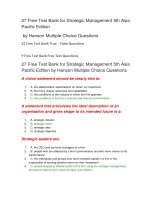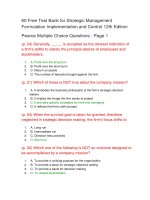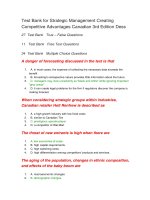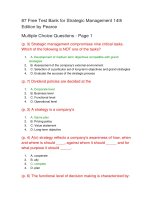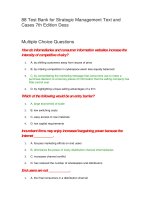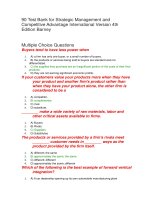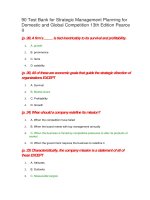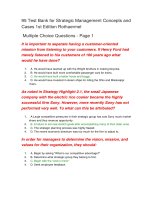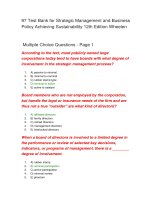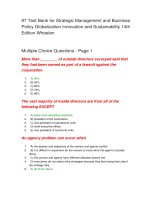Test bank for strategic management value creation sustainability and performance 1st edition bamford
Bạn đang xem bản rút gọn của tài liệu. Xem và tải ngay bản đầy đủ của tài liệu tại đây (84.79 KB, 15 trang )
Test Bank for Strategic Management Value Creation
Sustainability and Performance 1st Edition Bamford
The minimum return earned by a company that is necessary to attract
capital is known as
1.
a.normal profit.
2.
b.its internal rate of return.
3.
c.external profit.
4.
d.the hurdle rate.
A company that achieves a higher return on equity (ROE) than the
industry average earns
1.
a.the disdain of its peers.
2.
b.normal rents.
3.
c.the Malcolm Baldrige award.
4.
d.economic profit.
The detailed analysis of the financial statements of retail chains A
(Safeway), B (CVS Caremark), and C (Kohl’s) best illustrates the idea that
1.
a.drugstores always have a lower return on equity than grocers or department
stores.
2.
b.retail chains carry little cash and near-cash equivalents on their balance sheets
compared to other types of businesses.
3.
c.different businesses have operating characteristics that can be discerned by way
of a thorough investigation of their financial and operating data.
4.
d.grocers typically operate at low levels of overhead expense.
Which of the following is not a component of the key performance
indicator return on equity (ROE)?
1.
a.profitability
2.
b.asset productivity
3.
c.financial leverage
4.
d.market capitalization
Strategy should be assessed by combination of _______ and ________
measures.
1.
a.financial; environmental
2.
b.financial; governmental
3.
c.non-financial; legal
4.
d.financial; non-financial
The critical outcome measure of strategy is
1.
a.customer retention.
2.
b.performance.
3.
c.employee turnover.
4.
d.environmental sustainability.
Which of the following is not an aspect of measuring performance that is
important to consider from a strategic point of view?
1.
a.The performance measure reflects the company’s efforts as a whole.
2.
b.The performance measure can be compared to the same measure from rivals.
3.
c.The performance measure is easily calculated and interpreted.
4.
d.The performance measure reflects a company’s long-term commitments.
Individuals or groups who have an interest in or influence on the
operations of a company are called
1.
a.external operatives.
2.
b.moral agents.
3.
c.stakeholders.
4.
d.special interests.
When strategic management principles are applied in non-profit and
governmental organizations there is a need for ________ measures of
performance.
1.
a.human resource-based
2.
b.non-financial
3.
c.public accounting
4.
d.few, if any,
An examination of a company’s financial statements from a period of
several years allows the analyst to
1.
a.extrapolate the company’s likely future stock price from its past investments.
2.
b.estimate accurately the size and quality of the company’s pipeline of products
that are to be introduced in the near future.
3.
c.identify changes in strategy as well as gain insight into the higher-level thinking
that guides the company.
4.
d.forecast the company’s market capitalization for the next five- to ten-year period.
Value creation by companies can take many forms. Which of the following
is not a type of value that might be created by a company?
1.
a.economic
2.
b.cultural
3.
c.social
4.
d.instrumental
The advantage of common-sized financial statements is that they
1.
a.offer a clear comparison between companies of different sizes.
2.
b.are more accurate than the unconverted source statements.
3.
c.have all figures in U.S. dollars for comparative purposes.
4.
d.have been subject to a final audit by one public accounting firm.
The means by which a company seeks to generate returns greater than
those that rivals earn and that are greater than its cost of capital is called
1.
a.capital restructuring.
2.
b.economic logic.
3.
c.business process re-engineering.
4.
d.structuring for strategic change.
Eliminating waste, selling products that are produced with sustainable
methods, and installing natural power generation illustrate what approach
to achieving a competitive advantage and creating value?
1.
a.a purely economic approach
2.
b.a “green” or environmentally sustainable approach
3.
c.a knowledge-based approach
4.
d.a politically correct approach
Which of the following is most likely to measure performance that results
from a company’s long-term commitments?
1.
a.a financial measure such as return on equity (ROE)
2.
b.a company’s stock price at the close of trading on a given day
3.
c.a cell phone service provider’s customer “churn” for the most recent quarter
4.
d.a grocer’s coupon redemption rate for the most recent fiscal year
A key element of the emergent view of the appropriate dimensions for
assessing company performance is that the interests of ________ should
be taken into account.
1.
a.various stakeholders
2.
b.only stockholders
3.
c.capital providers, including debt holders,
4.
d.employees
Once we understand the economic logics of an industry, we have a better
chance of
1.
a.accurately diagnosing the strategy of a particular company in the industry.
2.
b.successful entry with a business model unlike any currently used by incumbents.
3.
4.
c.using that knowledge to drive competitors from markets where we have
significant interests.
d.creating first-mover advantages.
The residual income above that from normal profit that derives from the
efforts of management is known as
1.
a.excess rent.
2.
b.windfall profit.
3.
c.economic profit.
4.
d.return on investment.
Suppliers, creditors, customers, communities, and governments are all
________ of a company.
1.
a.internal stakeholders
2.
b.participatory agents
3.
c.informal auditors
4.
d.external stakeholders
Aside from return on equity (ROE), which of the following is commonly
used as a measure of performance?
1.
a.sales revenue growth
2.
b.returns to common stock
3.
c.measures of a company’s market value such as market capitalization
4.
d.all of the above are commonly used.
For 2006 Continental Airlines was able to report ROE of 106% compared to
7.3% for Southwest Airlines. While Southwest achieved higher
profitability, Continental had a much higher level of
1.
a.operating leverage.
2.
b.financial leverage.
3.
c.receivables turnover.
4.
d.working capital.
Which of the following statements is true about the U.S. airline industry as
described in the opening vignette for Chapter 2 of the text?
1.
a.All airlines confront identical industry conditions.
2.
b.Financial performance of the U.S. airlines was mixed during 2006.
3.
4.
c.Many airlines were considering mergers in response to tough industry
conditions.
d.All of the above statements are true.
Studies show that average industry performance varies greatly as does
the performance of companies within industries. Thus, one must pay
attention to performance measures that
1.
a.can easily be compared to other firms in the same industry.
2.
b.express commonalities across firms in different industries.
3.
c.are unique to the firm of interest.
4.
d.illustrate the risks of doing business in one industry versus another.
The financial performance of a firm
1.
a.should be the only consideration when assessing a strategy.
2.
b.should be used along with other measures, including some that are qualitative,
to assess a strategy.
3.
c.is not likely to be reported accurately in its financial statements, as can be seen
with Enron and WorldCom, so it is of little use when assessing a strategy.
4.
d.is more easily deduced by outsiders when the firm is privately held rather than
publicly traded.
Newman’s Own and Ben & Jerry’s are two examples of companies that
began their business operations with
1.
a.funding from friends and family.
2.
b.explicit social objectives.
3.
c.the desire to be the most profitable firms in their respective industries.
4.
d.a wish to employ as many people as possible.
Performance measures of interest to those involved with an organization’s
strategy should reflect
1.
a.marketing outcomes.
2.
b.human resource recruiting and staffing results.
3.
c.the company’s efforts as a whole.
4.
d.the interpretation of external analyses.
Employees, managers and officers, boards of directors, and stockholders
are all ________ of a company.
1.
a.external stakeholders
2.
b.indirect beneficiaries
3.
c.internal stakeholders
4.
d.fiduciary agents
It is typically a mistake for managers to forecast financial results as part
of the strategy formulation process. There are simply too many
assumptions necessary and a high probability that the environment will
change in significant ways, rendering financial forecasts inaccurate.
1.
True
2.
False
Strategy involves a pattern of asset allocations and inter-related activities
that manifests itself in financial results.
1.
True
2.
False
Return on equity (ROE) is one of the key performance indicators used by
the senior managers of organizations.
1.
True
2.
False
Common-sized financial statements have been reworked (using the
original entries) to fit a standard format that has been developed by a
major accounting firm.
1.
True
2.
False
The increasing adoption of strategic management principles by
organizations in the non-profit and government sectors of the economy
means that these types of organizations must identify financial measures
of their performance to gauge whether their strategies are working or not.
1.
True
2.
False
Economic profit is the residual income above normal profit that accrues to
those firms in an industry who choose to use a capital structure without
any long-term debt.
1.
True
2.
False
Once a given economic logic has been proven to generate superior
returns, all firms in the industry adopt that logic; we do not see a variety
of logics being used in any industry that has existed for a reasonable
period of time.
1.
True
2.
False
Return on equity (ROE) can be broken down into three other financial
measures of performance: Profitability, asset productivity, and financial
leverage.
1.
True
2.
False
Strategic performance should be assessed by a balance of customary
financial measures and emerging, non-financial measures.
1.
True
2.
False
An economic logic dictates nearly all of the details of a strategy for any
firm that chooses to operate under that logic.
1.
True
2.
False
Customary performance measures for assessing a strategy should reflect
the company’s efforts as a whole, be comparable with measures from
other companies, and reflect long-term commitments.
1.
True
2.
False
We define common stock returns--a common measure of performance--as
the dividend paid per share of stock divided by the price of the stock at a
given time.
1.
True
2.
False
Stakeholders are individuals and groups who receive or have the potential
to receive direct payments from an organization.
1.
True
2.
False
Amazon’s decision to build its own warehouses is evident upon close
analysis of the trend in its balance sheets.
1.
True
2.
False
One measure by which a non-profit might assess the effectiveness of its
strategy is by looking at how well its stakeholders are served.
1.
True
2.
False
A normal profit is the minimum return earned by a firm that is necessary
to attract and secure the owners’ inputs.
1.
True
2.
False
Revenue growth is a direct indicator of a firm’s ability to pare costs from
its operations.
1.
True
2.
False
In 2006 U.S. airlines performed nearly identically in terms of financial
results.
1.
True
2.
False
As a measure of performance, revenue growth typically occurs in lockstep
with growth in profitability; i.e., as revenues increase dramatically so does
profitability for nearly all firms.
1.
True
2.
False
Strategic financial analysis is able to show us what companies are really
doing regardless of what they say they are doing.
1.
True
2.
False
Emerging attributes by which we might assess a company’s performance
go beyond financial measures and include things like environmental
sustainability in company operations and societal contributions by the
firm.
1.
True
2.
False
Market capitalization is calculated as the number of shares outstanding
times the current market price per share of stock.
1.
True
2.
False
Every industry has developed measures of operating characteristics, or
metrics, that show how competitors are faring.
1.
True
2.
False
A fine-grained examination of financial statements can illustrate different
approaches to the marketplace.
1.
True
2.
False
Economic logic is the means by which a company seeks to generate a
return that is greater than its cost of capital and greater than the returns
earned by rivals.
1.
True
2.
False
5 Free Test Bank for Strategic Management Value
Creation Sustainability and Performance 1st Edition
Bamford Free Text Questions
What is meant when we say that one or more economic logics exist in an
industry?
Answer Given
The text defines an economic logic as “The means by which the successful
company seeks to generate a return that is greater than what competitors earn
and greater than its cost of capital.” That is, an economic logic is the method used
by firms to produce economic profits. A close synonym for an economic logic is a
business model. The firms in an industry may employ a variety of economic logics,
each of which is capable of earning economic profits. Or an industry may support
just one economic logic at a given time. Retailers of clothing, for example, use
both high-margin, low-volume logics and low-margin, high-volume logics with
success. Going back to the Sirius XM Satellite Radio example we can see two
economic logics at work in radio broadcasting. Land-based broadcasters rely
solely on advertising revenues. Sirius XM derives revenues both from subscription
fees and advertising. In the case of Sirius XM it is not yet clear whether its
economic logic will be able to produce economic profits so the industry’s dominant
logic is that of advertising as the source of revenues. The makers of video game
consoles follow a “razors and blades” economic logic. Little, if any, money is made
from the sales of game console hardware (the razor). However, significant profits
can be earned from the sales of popular games (the razor blades). The
manufacturers of inkjet printers employ this logic, too. These are industries in
which a single economic logic exists. One of the problems that plagued the early
dot.com startups was the absence of a clear economic logic for many web
ventures. On-line advertising was in its infancy. How were dot.coms to earn
economic (or normal, for that matter) profits?
Briefly describe the relationship between strategy formulation and the
analysis of financial statements.
Answer Given
A thoughtful, rigorous analysis of a firm’s financial statements is a window translucent though it may be - into the strategy formulated and implemented by
the company. It reveals a pattern of resource allocations and activities that are
meaningful indicators of a strategy. Financial statements can show information
about a firm’s strategy that is largely left unspoken.Internally, the projected
success of a newly formulated strategy is evaluated by its likely financial (and
other, as noted in the emerging measures of performance section) results. The
typical goals for a strategy are expressed in terms of financial and market-based
ratios. Thus the relationship between strategy formulation and financial analysis is
a two-way street. Or perhaps we might think of it as a roundabout. Strategies are
formulated to create results which are then used to evaluate the strategies.
Give some specific examples of how you might use the income
statements for two rivals in a comparison of their strategies.
Answer Given
First, one should make the comparison clearer by common-sizing the income
statements. This requires that revenues for each firm be set to 100% and the
statement expense and income items be expressed in percentages of revenue.
One might initially examine the gross profit margins for each competitor. A rival
with a higher gross profit margin could be charging higher prices (perhaps
because customers perceive the products to have more value). Or it could
command lower prices from suppliers due to high volumes of purchases. If the
rivals are manufacturers, the direct raw materials and labor costs for the higher
profit margin firm might be lower for any number of reasons, including the use of
non-union labor. A comparison of SGA expenses might reveal one firm to do a
better job of controlling overhead expenses. Employees who travel may be
required to fly coach rather than business class. Or employees who travel in
teams may be asked to share hotel rooms under the appropriate circumstances
(as Wal-Mart employees do). Lower interest expenses for one rival probably
indicate less debt for that firm. This can be confirmed with data from the balance
sheet. However, lower interest expenses might be offset by higher dividend
payouts. Too, the use of debt in relation to equity is one component in the makeup
of ROE. A lower percentage of debt in a firm’s capital structure (and, by extension,
a higher level of shareholder equity) will lower its ROE, all else held constant. One
should compare return on sales (ROS) for each firm. This is indicated by net
income as a percent of revenues. One rival with a higher ROS for an extended
period of time is a good indicator of a firm with a competitive advantage and an
effective strategy. The rivals’ ROEs should also be calculated to confirm the
relative effectiveness of each strategy.
Why should firms use non-financial measures of performance to assess
their strategies?
Answer Given
Performance should be measured wherever value is created. As the Whole Foods
example shows, value can be created outside of the economic sphere. Whole
Foods has created value for its suppliers and the communities in which it
operates. This kind of value cannot be accounted for by typical financial
measures. Furthermore, non-profits and governmental entities must be able to
measure the success of their strategies. By definition, however, they do not earn
profits and profits underpin nearly all financial assessments of strategies. These
organizations must identify and use alternatives to financial measures of
performance, such as how well stakeholders are served. Finally, society may be
coming to expect a broader definition of firm performance given the range of
undesirable outcomes that corporations, especially larger ones, may create in the
course of normal operations. For instance, the evolving social contract may make
some level of overall employment a measure of the success of the strategies of
many corporations.
How do financial statements help us determine whether or not a firm
holds a sustainable competitive advantage in the marketplace?
Answer Given
A firm holds a sustainable competitive advantage if it, for some longer period of
time, is able to earn economic profits. Economic profits are profits in excess of the
cost of capital and are earned as a result of skillful management decisions. One of
the key indicators of the presence of economic profits is a firm’s return on equity
(ROE). If the firm’s ROE is above the industry average and it incurs no risk above
the norm for the industry the firm is producing economic profits. A firm that
produces a superior ROE for one or two measurement periods (whether quarters
or years) may not hold a sustainable competitive advantage. Additional measures
used to determine whether a firm holds a sustainable competitive advantage
include revenue growth, common stock returns, and market capitalization. These
measures should be used in concert with return on equity when assessing the
nature of a firm’s competitive advantage. ROE and revenue growth can be directly
calculated from the firm’s own financial statements, while common stock returns
and market capitalization require additional information.
